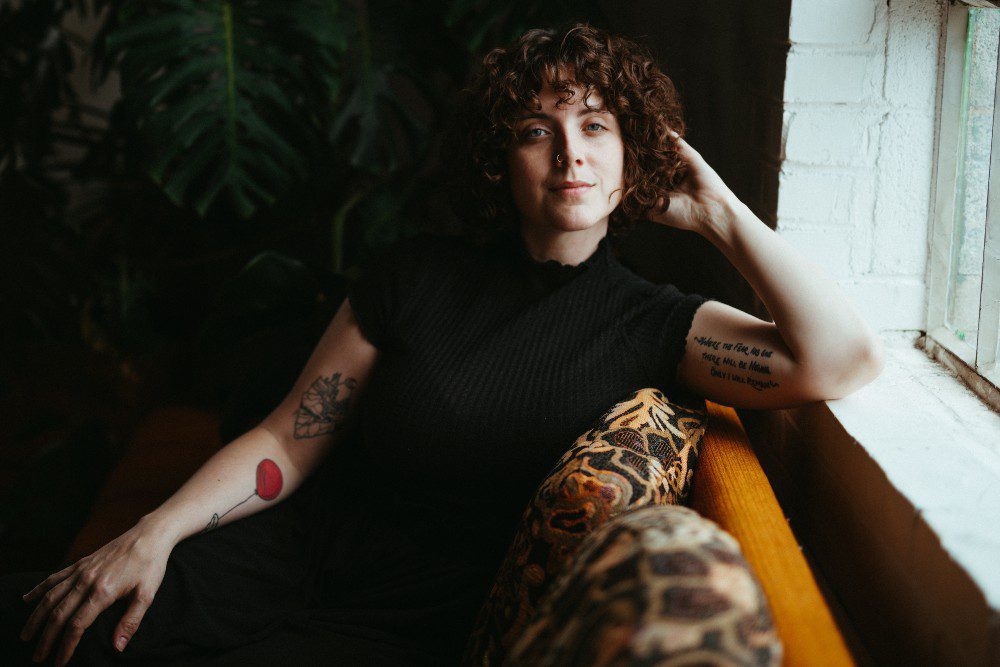Ora The Molecule Wanders Far and Wide on Debut LP Human Safari


Based in Oslo, Norway, 27-year-old Nora Schjelderup has spent the last 10 years collating ideas, travelling the US and Europe, and recording snippets of songs. Those precious fragments have come together as Human Safari, her debut album as Ora The Molecule, released July 23 via Mute Records.
It is a rainy morning in Oslo when Audiofemme catches up to Schjelderup. She is living in a cabin with her boyfriend and their dog Olive, a stray from Spain. “It’s pouring rain, but it’s been crazy hot the whole summer,” she says. “The hottest summer I’ve experienced in Norway, very strange.”
Though it is standard fare to talk about the weather, there is nothing really standard about Schjelderup or Ora The Molecule at all. In her world, and her lyrics, everything has life – the sky, the wind, the earth, the sun. This somewhat explains the band name. “It started off as Ora. I needed to be able to detach myself in a way. You can call it an alter ego or a concept that had more strength and power than my individuality,” Schjelderup explains. “The ‘Molecule’ came because I called my band a billion things, but I said to them, ‘You just need to fit together like mooolecules!’”
“Do you see the sky give you kisses and wash you clean?” sings Schjelderup on “Shadow Twin,” embodying the sentiment that nature – every molecule – is alive and sentient. But, like summer and sunny days, the promise of changing seasons and eventual thunder is ever present. To dismiss Human Safari as a tropical-scented, dance trip would be to miss its nuanced atmosphere, sonically and lyrically.
When she first formed the band in Los Angeles in 2015, Schjelderup was working for Warner Brothers as a songwriter and making money on the side as an Uber driver. “I had a biological father who was American, so I went there and got citizenship. Then I met some other musicians who encouraged me to make music,” she says. Until then, “I’d made music in my bedroom, but the American spirit is very different to the European in a way. They’re like, ‘go for it,’ really supportive. In Norway, we have musicians as well but people are much more focused on the classical way.”
She’d had guitar lessons as a kid, and given up on the violin and piano lessons her mother had enrolled her in. But her lack of formal training has forged an experimental attitude, and that sense of discovery and lack of inhibition on Human Safari is so inviting. It was recorded over years of travelling, none of it in a studio.
“There was something about being able to experiment on your own terms. I learned music production, everything I did, from YouTube. You can take your time. You can stop whenever you don’t understand something. There’s not pressure like at school,” she explains.
The layered harmonies that build like a summer rain of voices on “The Ball” reel you in with their loveliness. There’s a bouncy, minimal synth beat driving “Die To Be A Butterfly” and a breezy house vibe on “Shadow Twin.” The overall sensation is one of travelling, youthfulness, and joy. “I grew up listening to a lot of Suzanne Vega because my mum loves her so much. She has this very comforting way of singing that draws you in,” Schjelderup says, and the influence on melody, musicality and storytelling is evident. “The first time I heard Fleetwood Mac as a kid I started crying. It’s timeless, very melodic, but also musical.”
Schjelderup uses her own voice as an instrument in each of the songs, sometimes layered acapella-style, and sometimes in place of a piano or percussive instrument.
“This is funny,” she muses. “Most of the melodies made by my voice started off as the idea for an instrument, which comes from my lack of training. I’d go to rehearsal, and say, ‘I want the horns like this: la la la la.’ Then I’d hear it and get attached to the first, initial idea, the sound of the voice recording on my phone and think, ‘Maybe I’ll just keep the voice.’ My boyfriend jokes that it’s ridiculous. Especially on songs like ‘Silence,’ it’s just like ‘da da da da.’ I was inspired by non-talk, sounds with no talking, and language as a barrier. It was important to me to use the voice in a way that is universally understandable. You create boundaries if you limit yourself to English, or only Norwegian.”
Though the band lineup has changed over the years, and especially since COVID, there are current plans to assemble a solid band to work on the next album (yes, already underway) and to tour once restrictions allow.
“Right now it is Sju Smatanova – she’s a Slovakian drummer – and Jan Blumenthal is our German synth player who co-produced a lot of the album… but he’s not sure that he’s as committed as before. We’re in a changing process. We met in LA but now that everyone is in their home countries it’s difficult to rehearse and play across borders,” Schjelderup says. “We have a new keyboard player from Sweden, Lotta [Karlsson], and I met her at this gig in Oslo. I had to get a band together pretty fast and I went on this feminist Facebook group in Norway and asked ‘Who can play a gig in a week?’ and the first girl that wrote me, I called her up in the middle of the night and her voice was so enthusiastic, I didn’t even ask if she could play an instrument! It turned out amazing. I asked if she could play any horns and she brought a saxophone.”
Schjelderup left Los Angeles to tour as a techno DJ, and had planned to return to Norway to pursue music purely as a hobby. But fate stepped in when Blumenthal, who had been touring with Eliot Sumner’s band, met Schjelderup and heard her song “Creator.” He introduced her to his manager, who ultimately introduced her to the folks at Mute Records who would release Human Safari.
“We ended up moving to Spain to rehearse with the whole band, because it’s cheaper to live,” Schjelderup remembers. “I lived in Granada. We had that as a base for two years, until last year. We were living in a little village with only old people; we were the youngest in the whole village. All these pueblos, the villages, are emptying. They’re so happy when younger people come. I really miss that – they’re all farmers so they’d share their vegetables and we’d play music in the plaza for the old folks.”
The beautiful layers within Human Safari might deceive listeners into thinking it was a lush studio production, but in fact, it was largely DIY and so much the better for it. “It’s maybe surprising, but it’s a really simple recording setup: literally a computer, a midi keyboard and a good microphone. We could record anywhere,” Schjelderup says. “I would just sing and record throughout the whole journey. I was recording on friend’s sofas around Europe.” She says she awoke early one morning in London with the melody for “Helicopter” in her head, so she recorded it right away. “‘Sugar’ was made in the early morning too, just after we’d been out to a party,” she adds. “We were super hungover and didn’t want to get out of bed. The whole song was written like that, super fast. I prefer that type of working. I have anxieties with going into big studios.”
She is afraid that if the band has money, it will take the magic essence out of Ora The Molecule.
“Some of the songs are written in basements with no windows, just because we didn’t have money at all while doing this, like nothing,” she says. “We had to find cheaper solutions always, while travelling. I’m worried if money was to come into touring it would feel less personal. You wouldn’t meet as many people if you weren’t asking for favors, or if you had a nice hotel.”
It is hard to imagine that a nice hotel would change her relationship to music, nor her philosophy in general, influenced by seventeenth century philosopher Spinoza.
“There’s a sense of not trying to be judgmental of bad and good, more an observation of everything around, and a respect of everything. Like a molecule that doesn’t understand its own purpose, but it’s part of everything,” she says. “The way we structure society, it’s very functional and we look at every element alone. But you cannot separate elements from their natural habitat.”
Follow Ora the Molecule on Instagram and Facebook for ongoing updates.




